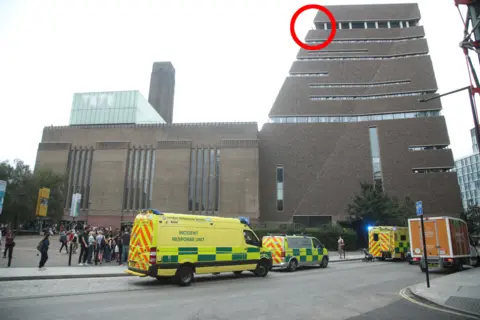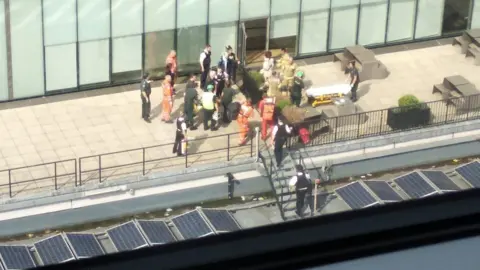Jonty Bravery: Tate attacker told care workers of plan to kill a year earlier
The teenager who threw a six-year-old boy from the 10th floor of the Tate Modern in London had spoken about plans to push someone off a high building about a year earlier.
A care worker to Jonty Bravery said opportunities to stop him were missed.
BBC News has obtained a recording of Bravery telling his care workers about a plan to kill someone and go to jail.
His care provider, Spencer & Arlington, said they had "no knowledge or records of the disclosure".
At the time of the attack Bravery, who has autism, was in the care of Hammersmith and Fulham Council. He lived in a flat in Northolt, west London, with round-the-clock care.
In the autumn of 2018, a worker called Olly - not his real name - recorded Bravery talking to him and another care worker about his plan to commit murder.
"In the next few months I've got it in my head I've got to kill somebody," Bravery said in the recording, obtained by a joint investigation with the Daily Mail.
He also tells his care workers he wants to go into central London and visit a tall landmark to push somebody off it.
"It could be the Shard, it could be anything just as long as it's a high thing and we can go up and visit it and then push somebody off it and I know for a fact they'll die from falling from a hundred feet," Bravery said in the recording.
He explains he is fed up with his situation and wants to be sent to prison.
 PA Media
PA MediaOlly said this was not the first time Bravery had spoken about this plan.
"There were a few incidences regarding trying to hurt people, life-wrecking incidences that he had planned in his head," he said.
The former care worker said he told a more senior colleague about what Bravery had said and played the recording to someone else involved in his care. They both deny this.
In a statement, Spencer & Arlington said there is "absolutely no evidence" that Jonty "may have told his carers of his plan".
It said there was no record of the disclosure in any care plan, care report or review from managers or his care workers, psychologists, or health workers.
However, the company said it recognised the "gravity of this claim" and had reported the concerns to the Care Quality Commission and local authority so they could be examined independently by the serious case review.
Bravery, 18, admitted attempted murder at the Old Bailey and is due to be sentenced this month.
After his arrest he told police he planned to hurt someone at the gallery to highlight his autism treatment on TV.
The victim, a French tourist, suffered life-changing injuries, including a "deep" bleed to the brain, from the attack last August.
In January, his family said he was still unable to stand but could now open his left hand.
 Stuart Haggas
Stuart HaggasOlly said when Bravery went to Spencer & Arlington in the summer of 2018, all trips out were supervised by two care workers at all times and had to be risk assessed.
But he claims that in the spring of 2019 the regime changed and Jonty was allowed to go out alone.
He said he recalled conversations with other support staff who told him Bravery had asked to visit the Tate and was later given permission to go out unsupervised by management.
An eyewitness, who restrained Bravery for around 20 minutes after he threw the boy from the Tate balcony, also told the BBC he saw no evidence of a care worker or anyone else with him at the time.
Olly said he believed the decision was "strange" and "very wrong", adding that it showed "a lot of precaution wasn't really taken in terms of how serious the matter could potentially be".
BBC News has spoken to a second care worker who also said that Bravery's regime became more relaxed to the extent that he was allowed out on his own, in spite of serious incidents when he was outside the flat.
Spencer & Arlington did not deny Bravery was allowed out unsupervised, either in general or during his visit to the Tate, but told BBC News it would be "inappropriate to make detailed comment" ahead of the serious case review and a pending sentencing hearing.


A terrible sign of a broken system is how some experts will see the claims that Jonty Bravery's warning that he wanted to kill, went unheeded.
It will be the task of the serious case review, through interviews and by examining records, to find answers to the many questions this raises about the teenager's care.
His is a rare case, but some point to the wider pressures on the system that supports people with mental health issues, autism and learning disabilities in the community.
Sir Stephen Bubb, who led a review into care for this group, maintains the failure to shut expensive longer stay hospitals - despite abuse scandals - has starved community services of money, so leading to difficulties finding the right facilities and enough staff.
The NHS and the government have said change is happening, but this case may raise some difficult questions about how that is working.

At the time of the attack Bravery was already on bail, accused of attacking and racially abusing another care worker on a day out.
Spencer & Arlington, which is rated "good" by the care regulator, said it believed it had "acted entirely properly in managing and reporting in its provision of care" for Bravery.
Once aware of the Tate incident it acted "swiftly and properly in notifying all key regulatory bodies", it added.
A statement from the Care Quality Commission said it was in direct contact with Spencer and Arlington, adding: "The local authority are the lead for the serious case review and we will be supporting this in any way required."
